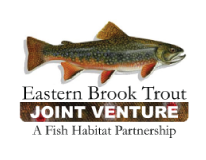2023 EBTJV Funding Opportunity
Announcement of RFP
The Eastern Brook Trout Joint Venture (EBTJV) is requesting project proposals that are focused on Brook Trout conservation actions. Federal funding is available through the National Fish Habitat Partnership as outlined under the America’s Conservation Enhancement Act of 2020. You can find the full Act here. EBTJV will score and rank proposals for consideration by the NFHAP board and the Department of the Interior.
This RFP opens on November 15, 2021. The deadline for submitting your Brook Trout conservation project proposal is 5:00 pm (Eastern Time) on January 21, 2022. Incomplete applications will not be considered, and late applications will only be considered in rare circumstances. Funding for FY2023 projects will likely not be appropriated by Congress until after January 2023 and will likely not be available to project leaders until March 2023 or later. Actual project start date will be the date grant agreement funding documents are signed. Project objectives must be met within the program timeline once the grant agreement is executed.
The maximum award amount for an individual project is $50,000. These funds can only be used for on-the-ground brook trout habitat conservation and restoration projects in the native eastern range, and related design and monitoring activities; they may not be used for research projects. All projects must also have a minimum of a 1:1 contribution from non-federal funding sources. To meet the 1:1 non-federal match requirement, non-federal funds contributions must not come from, be matched to, or otherwise tied to a federal source. Match can be generated at any time but must be spent during the project performance period, which is expected to begin in the summer of 2023. EBTJV will prioritize projects whose deliverables are expected to be completed within two years of the start of the project period.
To ensure available funding is being directed most effectively, proposed projects must be geared toward meeting the EBTJV’s range-wide habitat goals and objectives, as well as its key conservation actions. Projects must also fall under at least one of the NFHAP National Conservation Priorities. EBTJV prioritizes projects that are most likely to be fully implemented in the 2-year EBTJV/NFHAP project performance period. Additionally, the ACE Act places an emphasis on projects that increase recreational fishing opportunities through habitat improvements, that benefit the local economy, and that have a public educational component. EBTJV projects have historically incorporated each of these elements. New requirements under the ACE act include the 1:1 nonfederal match and an evaluation plan for assessing the results of the project and for measuring the associated improvements to fish populations, recreational fishing opportunities, and the local economy. Project applications will be reviewed and ranked based on their ability to meet these and other key factors that can be found in the EBTJV’s 2023 Project Scoring Criteria.
Special considerations
The ACE Act included special considerations for Indian Tribes that we are still awaiting interpretation of. Please contact the EBTJV Coordinator if you have a project on Tribal land.
The ACE Act allows a state, local government, or other non-federal entity to receive NFHP funds for the acquisition of real property from willing sellers if the acquisition ensures public access for fish and wildlife-dependent recreation or contributes a scientifically based, direct enhancement to the health of fish and fish populations as determined by the NFHP Board. All real property acquisition projects funded with NFHP funds must be approved by the state agency in the state in which the project is occurring. EBTJV has not yet incorporated property acquisition into its project selection. Please contact the EBTJV coordinator if you have a project request that includes real property acquisition.
Project application requirements
- 1. 2023 Project Application Form. Please follow instructions in the APPLICATION GUIDANCE document.
- 2. Letter of Support from the State Fisheries Management Agency - You must obtain a letter of support from the appropriate State Fisheries Management Agency for your project in advance of the application deadline (and realistically you should contact your Agency early in the process of designing your project). This letter should be from the individual that represents the state in the EBTJV whenever possible (EBTJV State Contact List). In addition, if project is located on private land, a landowner consent letter is needed. EBTJV does not currently have a template landowner consent letter, but you may provide your own.
- 3. Photographs and USFWS Copyright Release Agreement - Photographs in JPEG or TIFF format should be uploaded into your project folder independently of the application. A USFWS Copyright Release Agreement needs to be completed and uploaded for each photo submitted.
Project application packets must be submitted electronically via the EBTJV website in the folder labeled Upload your 2023 Project Application Packet Here . Only the Coordinator and you will be able to see the folder you create.
Please contact the Coordinator immediately if you experience technical difficulties with the website or need assistance with your application. If you are a first time user of the website, you will need to create a username and password. Please register here.
Incomplete applications will not be considered.
Applicants will be notified of their project’s ranking and funding status as that information becomes available. Successful applicants will be required to complete a separate series of documents to receive the funds, in coordination with the US Fish and Wildlife Service (FWS). NFHP funds are federal funds, administered through the FWS. All organizations that receive NFHP funding are required to complete all requirements for federal grants, including registration on the federal System for Award Management (SAM.gov), Automated Standard Application for Payments (ASAP), Grants Solutions grant management system, and provide interim and annual reports to the FWS and EBTJV. If your organization is not yet registered in the SAM system, please do so as soon as EBTJV notifies you of your award. NFHP funds are processed through a grant agreement completed through the USFWS Regional Offices or local FWCO office. Grants are paid on a reimbursable basis. If requesting indirect funds, applicants will need to submit a negotiated indirect cost rate agreement, take the de minimis cost rate, or bill everything directly. All applicants are required to complete environmental compliance documents, including National Historic Preservation Act Form, National Environmental Policy Act, and section 7 of the Endangered Species Act in collaboration with US FWS. EBTJV will also require a project end report with photos. Please see U.S. Fish and Wildlife Service National Fish Habitat Partnership Program (NFHP) Application & Award Requirements October 2021 for more information.
Applicants are strongly encouraged to contact their state EBTJV representative early in the process (EBTJV State Contact List). Applicants are also encouraged to contact their regional Fish and Wildlife Service office, although formal coordination with FWS during the application process is no longer a requirement. However, applicants that plan projects in coordination with or with input from these experts are much more likely to be successful.
Thank you for your interest in partnering with EBTJV to help us fulfill our mission to secure resilient populations of wild Brook Trout by protecting, enhancing, and restoring aquatic habitat and increasing human connections to, and stewardship of, our natural environment.
For questions, please contact:
Lori Maloney, EBTJV Coordinator
Subscribe to our email and newsletter list to stay in the loop.
Document Actions





